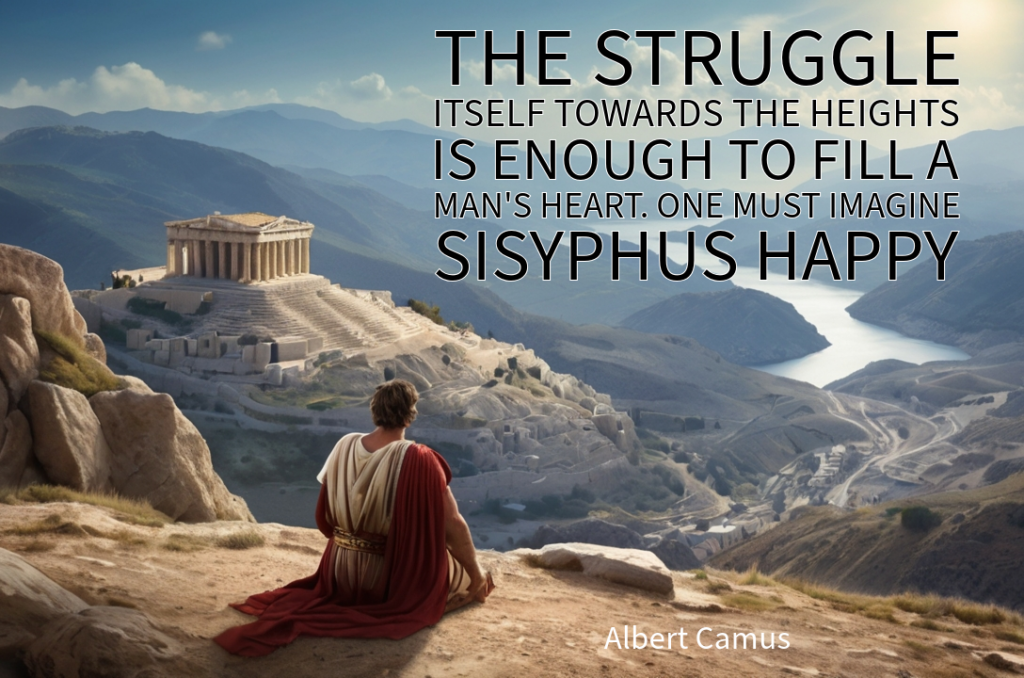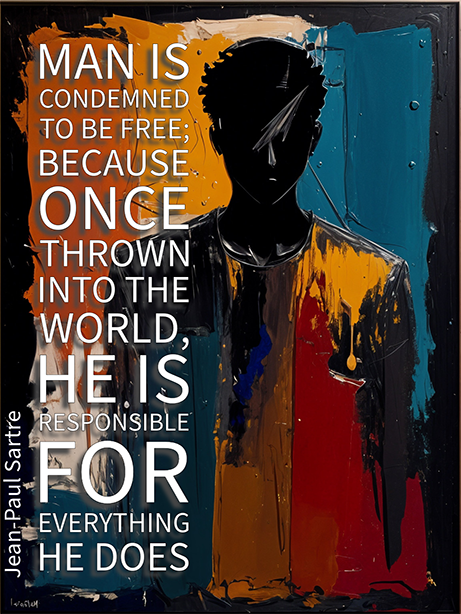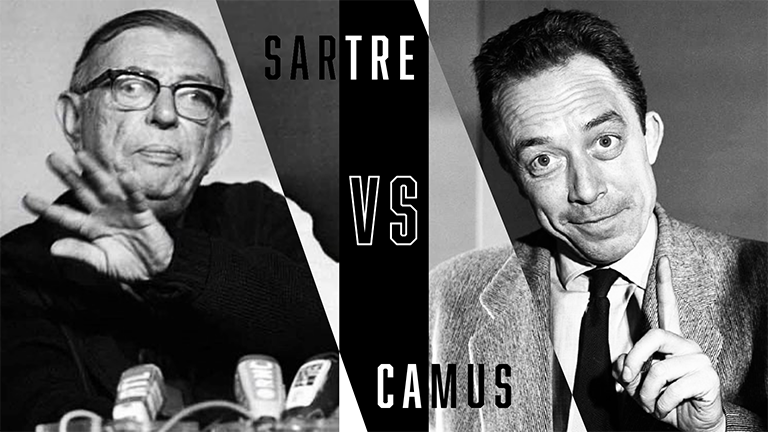In the annals of 20th-century philosophy, few figures stand as tall as Albert Camus and Jean-Paul Sartre. Both men lived through the tumultuous times of World War II, and their experiences profoundly shaped their thinking. For a time, they shared a friendship and intellectual camaraderie that electrified the Parisian philosophical scene. But their philosophical paths—and their friendship—eventually diverged, culminating in a public and personal feud.
While both philosophers remain towering figures, their ideas have aged differently. Camus’ philosophy of the absurd, with its emphasis on individual rebellion and moral integrity, feels especially relevant today. Sartre’s existentialism, though groundbreaking, is undermined by contradictions in his political alignments. Exploring their lives, ideas, and eventual falling out reveals why Camus’ ideas still shine brighter in the 21st century.
Experiences in World War II
Albert Camus
Albert Camus was deeply involved in the French Resistance during World War II. As an editor for the underground newspaper Combat, he risked his life to oppose the Nazi occupation of France. This period of resistance and moral struggle profoundly influenced his later works, particularly his views on rebellion and the human condition. Camus didn’t just theorize about resistance; he lived it. His wartime experiences gave his philosophy a tangible urgency, grounding his abstract ideas in real-world action.
Jean-Paul Sartre
Jean-Paul Sartre served in the French Army and was captured by German forces, spending nine months as a prisoner of war. Upon his release, he returned to Paris and became involved in the French Resistance, primarily through his writing. Sartre’s wartime experiences were no less formative than Camus’, solidifying his existentialist philosophy. His emphasis on human freedom and responsibility in the face of absurdity echoed his own struggles during the war.
Both men confronted the moral challenges of their time, but their responses foreshadowed their philosophical differences: Camus focused on rebellion against injustice, while Sartre leaned toward a radical freedom that could encompass revolutionary violence.
Philosophical Outlines and Major Works
Albert Camus
• The Myth of Sisyphus: This essay is a cornerstone of Camus’ philosophy of absurdism. Using the Greek myth of Sisyphus—condemned to roll a boulder up a hill for eternity—as a metaphor for human existence, Camus argues that life is inherently meaningless. However, instead of despairing, we can find personal meaning through our actions and our acceptance of the absurd.
• The Stranger: My introduction to Camus came through this novel in an English class. Its protagonist, Meursault, embodies the existential struggle against a meaningless world. The book’s themes of alienation and the absurd still resonate with me. And if you’re wondering, yes, The Cure’s song The Stranger is a direct nod to this novel.
Jean-Paul Sartre
• Being and Nothingness: Sartre’s magnum opus lays out his existentialist philosophy. He argues that “existence precedes essence,” meaning humans are not born with a predetermined purpose but must create their own through choices and actions.
• No Exit: This play, which I also first encountered in that same English class, brilliantly distills Sartre’s ideas. Featuring three characters trapped in a room together for eternity, the play explores the conflicts and self-deceptions that arise in human relationships. Its famous line—“Hell is other people”—still sparks discussions today.
Philosophical Differences
Camus’ Absurdism
Camus’ philosophy centers on the absurd—the tension between humanity’s desire for meaning and the indifferent universe. Acknowledging this absurdity is the first step to living authentically, Camus argues. He rejects nihilism and religious or ideological solutions that claim to provide ultimate meaning. Instead, he advocates for personal rebellion: the act of creating individual meaning through moral and creative choices.

Sartre’s Existentialism
Sartre’s existentialism emphasizes radical freedom and responsibility. He famously declared that humans are “condemned to be free,” meaning we bear the weight of creating our own essence through our actions. Sartre’s philosophy is deeply concerned with authenticity—living in alignment with one’s freedom—and avoiding “bad faith,” where individuals deceive themselves into thinking they are not free to make choices.
While both philosophers grappled with life’s lack of inherent meaning, their solutions diverged: Camus emphasized personal integrity, while Sartre leaned toward collective action, even at the cost of individual morality.

The Falling Out
The publication of Camus’ The Rebel in 1951 marked the turning point in their relationship. In this book, Camus critiques revolutionary violence and totalitarianism, arguing that the ends do not justify the means. Sartre, sympathetic to Marxist revolutionary ideals and the Soviet Union, saw this as a betrayal. His journal Les Temps Modernes published a scathing review, accusing Camus of being disconnected from political realities.
Their public feud escalated quickly, with personal and philosophical accusations flying back and forth. Camus defended his position, maintaining that no ideological goal could justify the loss of human life. Sartre, meanwhile, saw Camus as naïve and overly idealistic. The rift between them was never repaired, leaving a legacy of unresolved tension.
Camus, by contrast, offers a more consistent and morally grounded framework. His rejection of revolutionary violence and insistence on individual morality resonate in today’s world, where ideological extremism and political violence continue to challenge societies. Camus’ focus on personal rebellion against absurdity—without resorting to nihilism or dogma—provides a timeless guide for navigating life’s complexities.
Why Camus’ Ideas Are More Valuable Today
While Sartre’s contributions to existentialism are significant, his alignment with Marxist determinism reveals a troubling inconsistency. How can one advocate for radical freedom while endorsing an ideology that subordinates individual choice to historical necessity? Sartre’s willingness to excuse Stalin’s atrocities undermines the coherence of his philosophy.
In the end, Sartre’s existentialism challenges us to confront our freedom, but it’s Camus’ absurdism that shows us how to live with integrity in an absurd world
Recommended Reading: Real Conservatives, The Rubicon













Leave a Reply